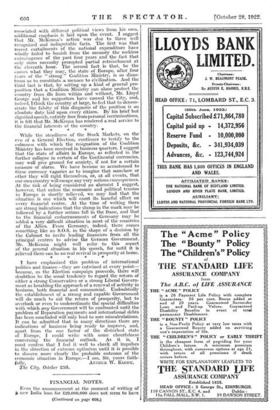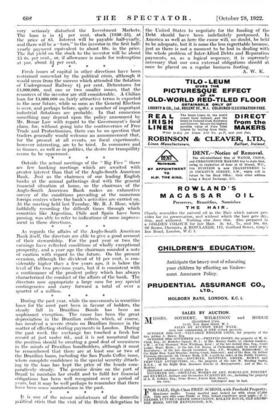FINANCIAL NOTES.
Even the announcement at the moment of writing of new India loan for £20,000,000 does not seem to have (Continued on page 008.) very . seriously disturbed the Investment Markets. The loan is in 41 per cent. stock (1950-55), at the price of 85. Interest will be payable half-yearly, and there will be a " turn " to the investor in the first half- yearly payment equivalent to about 10s. in the price. The flat yield on the stock to the investor will be about £5 6s. per cent., or, if allowance is made for redemption at par, about 51- per cent.
Fresh issues of capital in other directions have been restrained somewhat by the political crisis, although it would seem from the success which attended the flotation of Underground Railway 41 per cent. Debentures for £4,000,000, and one or two smaller issues, that the resources of the investor are still considerable. A Chilian loan for £4,000,000 on fairly attractive terms is expected in the near future, while so soon as the General Election is over, and perhaps before, quite a number of important industrial flotations are probable. In that connexion something may depend upon the policy announced by Mr. Bonar Law with regard to the Government's fiscal plans, for, without going into the controversies of Free Trade and Protectionism, there can be no question that traders generally would welcome an announcement that, for the present at all events, no fiscal experiments, however interesting, are to be tried. In commerce and in finance, as well as in politics, the desire for tranquillity seems to be uppermost. * * * * Outside the actual meetings of the " Big Five " there are few banking meetings which are awaited with greater interest than that of the Anglo-South American Bank. Just as the chairmen of our leading English banks at the annual gatherings deal with the general financial situation at home, so the chairman of the Anglo-South American Bank makes an exhaustive survey of the conditions prevailing at the numerous foreign centres where the bank's activities are carried on. At the meeting held last Tuesday, Mr. R. J. Hose, while faithfully recording the difficult times through which countries like Argentina, Chile and Spain have been passing, was able to refer to indications of some improve- ment in those directions.
* * * As regards the affairs of the Anglo-South American Bank itself, the directors are able to give a good account of their stewardship. For the past year or two the earnings have reflected conditions of wholly exceptional prosperity, and a year ago the chairman sounded a note of caution with regard to the future. On the present occasion, although the dividend of 12 per cent. is con- siderably higher than a few years ago, it is below the level of the two previous years, but it is consistent with a continuance of the prudent policy which has always characterized the conduct of the affairs of the bank. The directors now appropriate a large sum for any special contingencies and carry forward a total of over a quarter of a million.
During the past year, while the movements in securities have for the most part been in favour of holders, the steady fall in Brazilian Bonds has been an unpleasant exception. The cause has been the great depreciation in the Brazilian milreis, which, of course, has involved a severe strain on Brazilian finance in the matter of effecting sterling payments in London. During the past week the exchange has touched a fresh low record at just under 6d., and it is not unnatural that the position should be creating. a good deal of uneasiness in the minds of Brazilian bondholders, although it must be remembered that there are at least one or two of the Brazilian loans, including the San Paulo Coffee issue, where complete confidence in the special security attach- ing_ to the loan has kept the price of the bonds com- paratively steady. The genuine desire on the part of Brazil to maintain her credit and to fulfil her financial obligations has been well recognized over a period of years, but it may be well perhaps to remember that there have been some moratoriums in the past. * * * * It is one of the minor misfortunes of the domestic paitical crisis that the visit of the British delegation to the United States to negotiate for the funding of the Debt should have been indefinitely postponed. In America as well as here the cause will, no doubt, be held to be adequate, but it is none the less regrettable because, just as there is not a moment to be lost in dealing with the whole problem of Inter-Allied Debts and Reparation payments, so, as a logical sequence, it is supremely necessary that our own external obligations should at once be placed on a regular business footing.
A. W. K.











































 Previous page
Previous page